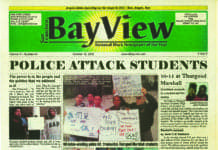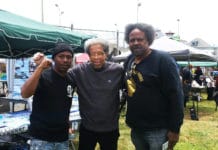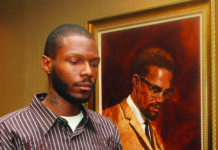by Minister of Information JR
Author Deeann Mathews has done something that the musicians in our community have needed to do for a long time en masse. She learned the ins and outs of the music business, then wrote a book about it, called “The Freedom Guide for Music Creators,” to share her wisdom.
Black musicians have been cheated out of their work and royalties for a long time. The popular music of the United States was built off of Black music, since the days of the Blues and Jazz, which in turn means that Black musicians have been getting robbed in the music industry at least since then. This book is an introduction into the business side of the music business. It is basically the first step in orienting oneself to this sector of the law and one’s rights. There aren’t too many people with this type of expertise who are willing to share the knowledge – what do they say? “The game is to be sold not told.”
Check out Deeann Mathews in this exclusive Q&A interview.
M.O.I. JR: What inspired you to want to write a book like this? How long did it take you?
Deeann: Largely it was being around musicians – mostly African American and mostly older than me – who kept telling similar stories of being taken advantage of by people in the industry and sometimes their own co-writers and other partners. These were extremely talented people who were cheated of time, energy, hundreds if not thousands of dollars each, and sometimes lost the rights to their work as well. One songwriter that I knew, a very conscious sister, had the distinct horror of having her song stolen and then hearing the end result – just another song that depicts Black women as just sexual objects.
The last straw was when a teenage cousin of mine had his songs stolen by his studio. I came to visit him in Los Angeles a little after that and found out; I gave the advice I could and then promised I would go out and find resources so that my cousin would be prepared to protect himself next time around. But I already knew it would be a long, fruitless search. Basically, if you haven’t been taught how to read works on legal and technical subjects, there are very few resources on music business that you can read and use, even before you hit the music business jargon. But I have always believed that if you can’t find what you need, you’re responsible for creating it. Thus, the book was born.
It took two years to create the book, from 2006 to 2008. I went to see my cousin in 2006; in that same year I was running a series of articles in Sacramento Church Life about music business basics largely focused around church musicians. So I had my basic material laid out. In 2007, I found the heart of the book; I took Economics 30, Economics for African Americans, at City College of San Francisco. Suddenly I realized that the way the music industry was treating my associates was part of the same business pattern that predates both capitalism and communism – the preference, shall we say, for getting unpaid labor and resources that resulted in our foreparents being stolen from Africa and the continued theft of their labor and talents that has continued to the present day.
I also discovered that the sharecropping system my grandparents and some of my living friends labored under is eerily similar to standard practice in the record industry. Substitute the cost of studio time, tour support and CD production for the cost of seed and equipment, and you’ve got the same system that held many of our people in debt bondage for 100 years after slavery ended – you have to “borrow” all the things you need to get your project done against your future royalties, but you don’t necessarily have the right to audit the books to see if your debt has been paid back so you can be paid. AND, the debt can be rolled into further projects in perpetuity. After I had grasped all that, then I had the soul of the book, which I completed in 2008.
M.O.I. JR: Who is your audience and who did you want to benefit from this?
Deeann: In the broadest sense, any musician about to hit the realities of the music business is my audience; exploitation in the music industry is now an equal opportunity problem. However, African American musicians, to whom the entire modern musical sphere owes a tremendous debt that has not been paid in any significant sense, are my first concern – in this economy in which we continue to produce the top-selling forms of music, we need to set the foundations to “pay ourselves first.”
M.O.I. JR: What is the importance of a musician knowing the ins and outs of the music business, like what you have detailed in this book?
Deeann: A musician who does not understand copyrights and licensing at the least is just offering himself or herself up to be sharecropped – stolen from, driven broke and embittered. It is that simple. We can’t help the fact the system is the same system it’s been for 500 years – we can stop offering ourselves up as victims.
M.O.I. JR: What are your career ambitions? Do you plan to write more books? Do you intend to continue in the music business?
Deeann: Career ambitions … I want to see this book in every place where it is needed, across the country and then the world; I’m mulling what I need to do in terms of putting forward “internationally compliant” editions. However, I’m one of those old school types that works the local area, then the regional area and then beyond … so, Book 1 will probably occupy me for a good long time. There is a second book forming in my mind – I get questions now from clients about how they should start putting themselves out there if the record industry route is not for them, and I’m thinking about some answers. So yes, I intend to stay in the industry. I am also a musician in my own right and, as time permits, I work on different projects.
M.O.I. JR: How do people stay up with you?
Deeann: The easiest way is the e-mail address: d_mathews60@yahoo.com. I suggest folks wanting to contact me this way put in the subject line that they got the address from the SF Bay View or Block Report – that will help me pick them out of the crush of e-mail I get daily. I’m not on Facebook yet, but I am active on Twitter giving out tidbits of music business know-how. Search for me as DeeannDMathews. In person, it’s often possible to catch me running in and out of Marcus Bookstore in San Francisco, and I’ll be manning a booth in the San Francisco Juneteenth Festival in the Fillmore, on the 18th and 19th of June.
Email POCC Minister of Information JR, Bay View associate editor, at blockreportradio@gmail.com and visit http://www.blockreportradio.com.

 Store
Store










